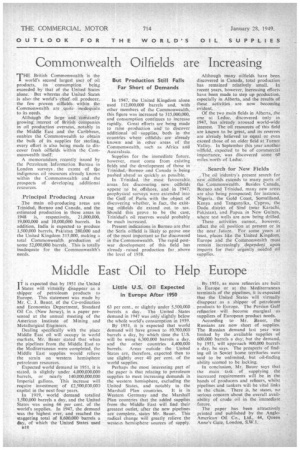Commonwealth Oilfields are Increasing
Page 24

If you've noticed an error in this article please click here to report it so we can fix it.
But Production Still Falls Far Short of Demands
THE British Commonwealth is the world's second largest. user .of oil products, its consumption being exceeded by that of the United States alone. But whereas the United: StateS is also the world's chief oil. producer, the few proven oilfields. within. the.. Commonwealth are .quite inadequate
to its needs. "
Althdtigh the large and :constantly growing: interest of British edmpanies in oil production overseas,. notably in the Middle East and the Caribbean, enables the Commonwealth to obtain the bulk of its supplies for sterling, every effort is also being made to discover fresh oilfields Within the Com
monwealth itself:. •- A memorandum. recently issued by the Petroleum Information Bureau in London surveys, the extent of the indigenous oil resources already known within the Commonwealthand the prospects of developing additional resources.
Principal Producing Areas
The main oil-producing areas are Trinidad, Borneo and Canada, and the estimated production in these areas in 1948 is, respectively, 21,000,000, 19,040,000 and 10,000,000 barrels. In, addition, India is expected to produce 1,500,000 barrels, Pakistan 280,000 and the United Kingdom 315,000, making a total Commonwealth production of some 52,000,000 barrels. This is totally inadequate for the Commonwealth's needs.
In 1947, the United Kingdom alone used 112,000,000 barrels and, with other members of the Commonwealth; this figure was increased to 315,000,000, and consumption continues to increase rapidly. Great efforts are being made to raise production and to discover additional 'oil ?supplies, both in the countries where oilfields are already knownand in other . areas of the Commonwealth, such as Africa and Australasia.
Supplies for the immediate future, however, must come from existing fields and the development of those in Trinidad,. Borneoand Canada is being pushed ahead as quickly as possible.
In Trinidad. the most favourable. areas for discovering new oilfields appear to be offshore, and in 1947, geophysical surveys were extended into the Gulf of Paria with the object of discovering whether, in f act,. the existing Oilfields do extend out to sea. Should this prove to he the case, Trinidad's oil reserves would probably be much increased.
Present indications in Borneo are that the Seria oilfield is likely to prove one of the most important so far discovered in the Commonwealth. The rapid postwar development of this field has already • raised production far above the level of 1938. Although many oilfields have been discovered in Canada, total production has remained relatively small, in recent years, however, increasing efforts have been made to step up production, especially in Alberta, and the results of these activities are now becoming evident.
Of the two main fields in Alberta, the one at Leduc, discovered only • in 1947, has already aroused world-wide interest. The oil resources of this field are knqwn to be great, and As reserves are already believed to equal or even exceed those of an older field at Turner Valley. In September this year another oilfield, expected to be of commercial importance, was discovered some 60 miles "north -of Leduc.
Search for New Fields
The oil industry's present search for new . oilfields extends to many parts of the Commonwealth. Besides Canada, Borneo and Trinidad, many new areas are also being prospected; for instance. Nigeria. the Gold Coast, Somaliland, Kenya and Tanganyika, Cyprus,. the Dada district of Sind (near Karachi, Pakistan), 'and Papua in New Guinea, where test wells are now being drilled.
• These activities cannot, however, affect the oil position at present or in the near. future. For some years at least, places like the United Kingdom, Europe and the Commonwealth must remain increasingly dependent upon imports for their urgently needed oil supplies.
. .




























